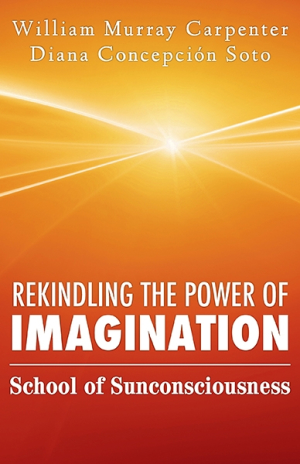
Rekindling the Power of Imagination
School of Sunconsciousness
Young children instinctively use their imagination to learn about life. Unfortunately, that important ability can get pushed aside as they grow to adulthood. William Carpenter and Diana Soto have written an intelligent and well-organized book with the intent of helping readers revitalize their creative instincts.
In Rekindling the Power of Imagination: School of Sunconsiousness, the authors present a method of word study they call “word alchemy” that encourages the use of imagination to expand self-awareness. Both Carpenter and Soto have had a lifelong interest in the origins and meanings of words.
The book consists of three chapters covering a curriculum the authors have developed for what they tag as the kindergarten, primary, and high school levels. The superintendent of the School of Sunconsciousness, Professor Murray, gives brief orientations and conclusions at the beginning and end of each chapter, respectively. The teacher, Dr. Is, leads all classes in a course of study the authors say is designed to unlock the genius within each student. Students learn to uncover the historical symbolism and hidden meanings of words such as teach, mystery, energy, and love. The table of contents provides a guide to topics covered in each class.
While studying the word character, students are asked to consider both their dark, harmful sides and their light, positive attributes. Dr. Is encourages them to think about and write down their strong and weak points, urging them not to discuss the information with others, to avoid any distracting feedback. He explains, “Your job as Sunconscious students is to shine the light on your dark traits as needed, thereby disarming and nullifying their effects.”
The primary-school students study the meaning of the numbers one through ten as well as each letter of the alphabet. The authors tell students that the lessons are difficult and that lengthy examination of some of the letters may seem tedious. However, those who persevere can learn interesting facts through word play. For example, as high school begins, Professor Murray introduces the idea of an internal “janitor,” a word originating from the name “Janus,” the Roman god of beginnings and endings. She asks students to imagine that a janitor lives inside each person, explaining that “the janitor is responsible to keep the body clean inside and out and to remove any physical, mental, and emotional garbage.”
Carpenter and Soto have developed a highly personalized method of teaching people to rekindle their imagination and experience more rewarding lives. The almost error-free text succeeds as a practical, easy-to-follow handbook, but its setting in a fictional classroom may confound some readers. Nonetheless, the book offers an interesting concept devoted to recapturing a natural state of awareness and sense of universal connection. Those who enjoy the challenge of stretching their imagination will learn and be inspired by the book’s message.
Reviewed by
Margaret Cullison
Disclosure: This article is not an endorsement, but a review. The publisher of this book provided free copies of the book and paid a small fee to have their book reviewed by a professional reviewer. Foreword Reviews and Clarion Reviews make no guarantee that the publisher will receive a positive review. Foreword Magazine, Inc. is disclosing this in accordance with the Federal Trade Commission’s 16 CFR, Part 255.
